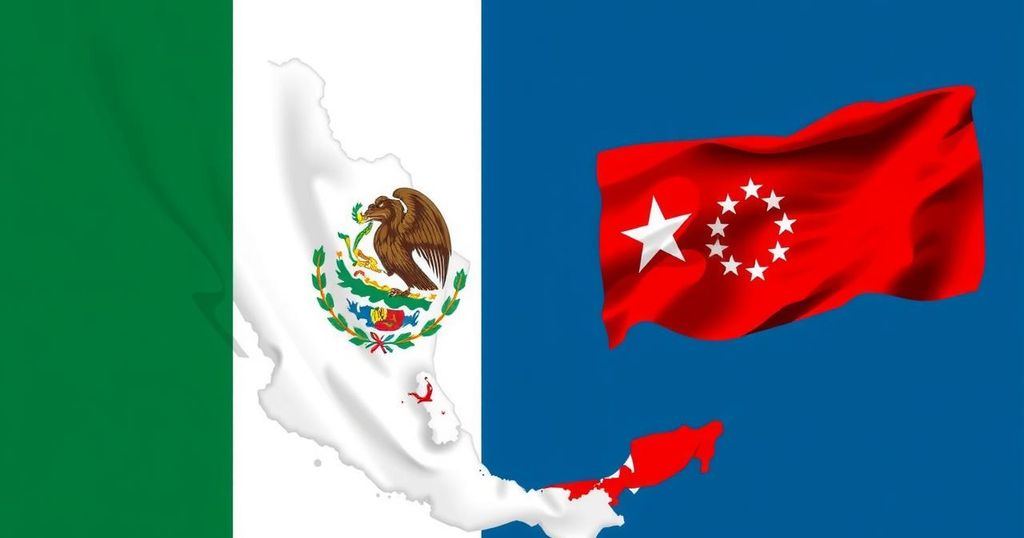Mexico has become a crucial supporter of Cuba’s dictatorship, stepping in as a key ally as Venezuela’s support dwindles. Under President Claudia Sheinbaum, Mexico is supplying significant amounts of oil and food to Cuba while neglecting pressing domestic issues, raising concerns about the implications for democracy and human rights both at home and in Cuba. Critics argue that Mexico’s support is misdirected, prioritizing authoritarian solidarity over the welfare of Cuban citizens.
In recent years, Mexico has positioned itself as a key financial backer of Cuba, aligning itself with Russia and Venezuela in supporting the island’s longstanding communist dictatorship. Historically, Cuba relied on the Soviet Union for substantial aid until its collapse in 1991, when Venezuela took over as Cuba’s primary benefactor under the rule of Hugo Chavez, contributing $35 billion primarily in oil over a span of 15 years. However, with Venezuela now facing severe economic challenges, Mexico has stepped in, providing food, oil, and other essential supplies to the beleaguered regime in Havana. Despite the rising turmoil and violence within Mexico, including a recent spike in criminal activity marked by bombings and assassinations, President Claudia Sheinbaum has prioritized supporting Cuba over addressing domestic crises. For instance, in 2023, she guaranteed a record supply of 5.4 million barrels of oil to Cuba—valued at approximately $391 million—articulating her commitment to the regime. These actions have drawn criticism, particularly as Cuba continues to suppress its citizens, imprison political opponents, and maintain an authoritarian grip on power. Moreover, Sheinbaum’s administration has showcased an alarming trend towards sacrificing Mexico’s democratic principles in favor of solidarity with Cuba. The Mexican government has been opaque regarding the terms of its cooperation with Cuba and has responded to domestic blackouts exacerbated by its energy commitments to Cuba with little accountability. As a result, Cuba’s economic mismanagement, which includes the reliance on foreign aid and misallocation of resources, continues with little hope for reform. It is worth noting that the relationship between Mexico and Cuba raises significant ethical concerns. Instead of conditioning aid on improvements in human rights and the establishment of fair governance in Cuba, Mexico appears to bolster the dictatorship’s repression while it neglects vital democratic principles at home. Thus, Sheinbaum’s policies represent an endorsement of authoritarianism under the guise of solidarity with the Cuban people, betraying the very values of democracy that both nations are said to uphold.
For several decades, Cuba has relied on external support to maintain its communist regime. Following the dissolution of the Soviet Union, Venezuela emerged as Cuba’s primary ally, providing critical resources to sustain its economy. Today, with Venezuela grappling with its own economic collapse, Mexico has assumed the role of Cuba’s benefactor. The recent actions by the Mexican government illustrate a shift in its foreign policy priorities, placing support for a dictatorship above the welfare of its citizens and the promotion of democratic values. This situation is further complicated by increasing domestic instability in Mexico, which raises questions about the implications of such foreign entanglements on national security and governance.
The recent engagement of Mexico with Cuba highlights a troubling trend of prioritizing foreign alliances with authoritarian regimes over the promotion of democratic governance. As Mexico solidifies its role as a principal supplier to the Cuban dictatorship, questions arise regarding its commitment to human rights and democratic values. The actions of President Sheinbaum’s administration seem to condone repression rather than support the Cuban people in their quest for freedom, ultimately undermining both nations’ democratic foundations.
Original Source: thehill.com






